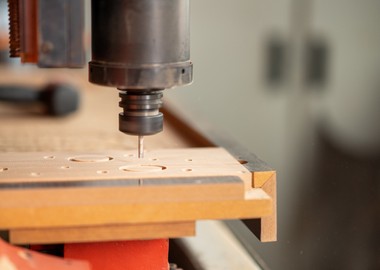Just like Uncle Sam, the wood industry wants you. As a military veteran, you have already proven you have the discipline, commitment and resourcefulness needed to succeed in a high-paying wood industry job.
Think your military accomplishments may not be easily recognizable in the civilian world? Think again. Here are just a few examples of wood industry jobs that value the hands-on experience vets bring to the table.
1 – Flooring Installer: Build Your Career From the Ground Up
For every residential and commercial building project, there is a flooring installer. But unlike many entry-level construction jobs, wood flooring installers can make over $40,000 a year.
What’s more, you do not need a formal education to start earning a great paycheck. However, you will need extensive on-the-job training to master the craft of wood flooring installation. Fortunately, there are numerous apprenticeship programs in repair technologies, construction management or facilities management that allow you to earn income while you complete installer training.
While earning a paycheck, you could be learning the wood industry job skills you need to remove existing flooring, measure and cut flooring, and how to properly lay finish materials that improve the aesthetic of residential and commercial buildings. Many experienced wood flooring installers go on to start their own businesses to secure flooring repair, maintenance and specialty installation projects as independent contractors.
Earning great pay as a wood flooring installer begins with acquiring the right skills during on-the-job training, such as:
- Mastering hand tools and power tools.
- Gaining customer service and consultation skills.
- Using math to measure/calculate material requirements.
- Honing customer-service skills and your eye for detail.
- Increasing your physical skills required to lift and move flooring pieces.
2 – CAD Designer: Get Your Tech Game On
If you are one of those people who must have the latest smartphone or other tech gadget, then CAD designer may be the right wood industry job for you. Many wood manufacturing jobs involve working with technically-advanced design tools that will give you the opportunity to build a career that matches your fondness for technology.
It is also why CAD designer is one of the most coveted jobs in the wood industry, especially when you are looking at salaries close to $60,000 a year. Jobs involving computer-aided drafting and design (CADD) can pay even more — and offer you the chance to grow into engineering, supervisory or analytical careers. These jobs often involve using CAD software to design projects or to convert engineering or architectural drawings/specifications into technical drawings.
There are multiple types of wood industry jobs that utilize CAD design skills, such as a CAD technician or CAD drafter. These careers do not require four-year college degrees, but usually require some type of associate’s degree and on-the-job training.
As a CAD designer, you’ll have the chance to build skills such as:
- Designing products using specific engineering and manufacturing techniques.
- Learning building techniques to add details to architectural plans.
- Specifying dimensions, materials and processes for new products.
3 – Woodworking Machinist/Machine Operator: Grow Your CNC Skills
Today’s “woodworker” has the opportunity to work with high-tech machinery, as well as with his or her hands. Modern wood industry jobs, such as a woodworking machinist or machine operator, involve mastering complex machinery such as AI-powered robots or computer numerically controlled (CNC) machines.
Woodworking machinist jobs range from shaping individual wood pieces such as a musical instrument to using high-tech design tools to produce artisan-quality products on a massive scale. No formal education is required to earn close to $37,000 a year, but most machine operators require critical thinking skills and hand-eye coordination to operate machinery while adhering to health and safety standards. The job may involve evaluating blueprints and specifications to set up proper materials, series of operations and settings on machines.
Other job duties may include:
- Operating drill presses, lathes, routers, sanders and planers.
- Sawing machine operation, which may be combined with CNC machining.
- Detailing wood pieces for accuracy and quality.
- Assembling wood structures and creating frames.
- Positioning wood stock for cutting, modelling and sanding according to specifications.
4 – Cabinetmaker & Bench Carpenter: Channel Your Creative Energy
Today’s cabinet-making profession has grown from totalitarian functionality into a skilled craft to create artistic, wood cabinetry for a variety of residential and commercial structures. Specialized cabinetmakers and bench carpenters are in high demand and start as high as $37,000 a year, with one to three years of on-the-job training.
This wood industry job involves cutting, shaping, assembling and fabricating parts for cabinets, as well as for other wood products such as furniture. Cabinetmakers also design and build sets of cabinets that are customized for particular spaces, such as a workplace break room. This type of custom project often begins with designing a set of cabinets to fit space specifications and then ends with installing the cabinets.
In addition to an eye for detail, cabinetmaker skills may include:
- Using a variety of tools and machines to fabricate and assemble wood parts and products.
- Bringing an architect’s vision to life by fabricating cabinetry and furniture per blueprint specifications.
- Working safely with carpentry power tools and cabinetry hand tools.
5 – Finisher/Finishing Specialist: Use Your Eye for Detail
Skilled wood finishers and finishing specialists can breathe new life into old furniture, as well as help create new custom furniture or other wood products. Salaries start around $34,000 a year, and job opportunities range widely, from furniture manufacturing companies to working independently to restore and finish damaged and second-hand items.
Like many other wood industry jobs, a wood finisher may also have the opportunity to become his or her own boss, after acquiring a solid knowledge of finishing techniques and developing a keen eye for detail. Specific wood finishing tasks may involve repairing broken parts, removing imperfections and filling in cracks.
Other expected wood finishing duties include:
- Identifying different hues and selecting appropriate products to finish wood surfaces.
- Inspecting wood for rot or physical damage.
- Ensuring sanding dust and other debris have been removed.
- Communicating and problem-solving finishing challenges.
- Carrying out mathematical calculations and using physical stamina and strength to finish the job.
Explore a Career in the Wood Industry
Still unsure if a wood industry job is right for you? Earning good pay in a rewarding career begins with the right training, which is readily available on the job for most wood industry careers.
The Wood Industry Resource Collaborative (WIRC) partners with wood trade associations to provide online resources to help you find job opportunities and training in your area. Start exploring your options for building a civilian future.


